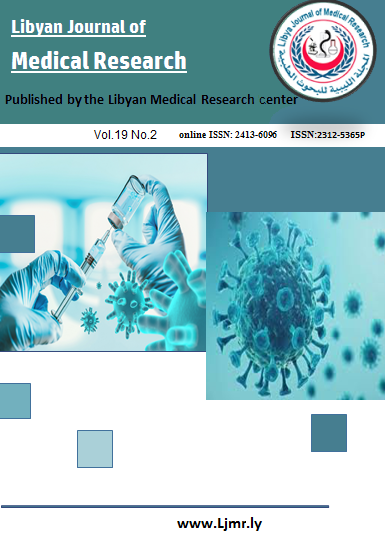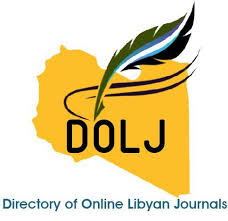Pregabalin Misuse and Associated Adverse Events: A Cross-Sectional Study in Libya
DOI:
https://doi.org/10.54361/LJMR.19.2.38Keywords:
Pregabalin, Drug misuse, Adverse effects, Withdrawal, LibyaAbstract
Background: Pregabalin, a gamma-aminobutyric acid (GABA) analogue, is widely prescribed for neuropathic pain, fibromyalgia, anxiety disorders, and epilepsy. Despite its therapeutic value, pregabalin has been increasingly associated with misuse and significant adverse effects. Aim: This study aimed to evaluate the prevalence, severity, and pattern of adverse effects related to pregabalin abuse among adults in Western Libya. Materials and Methods: A descriptive cross-sectional study was conducted in Zawiya, Libya. Data were collected using structured questionnaires from 80 participants with a history of pregabalin use. Descriptive statistics were applied. Results: The majority of participants (55%) were young adults (20–30 years), and 57.5% reported non-medical use of pregabalin. High doses (≥300 mg) were commonly used without medical supervision. Reported side effects included blurred vision (75%), sleepiness (72.5%), dry mouth (65%), and cognitive impairment (45%). Withdrawal symptoms after discontinuation were severe, including headache (87.5%), stress (80%), sleep disturbance (77.5%), tachycardia (75%), and depression (60%).Conclusion: Pregabalin misuse is prevalent among Libyan adults, particularly young individuals with low educational levels. Adverse effects and withdrawal symptoms were frequent and severe, underscoring the urgent need for stronger regulatory measures, public awareness campaigns, and safer prescribing practices.
Downloads
References
1. Althobaiti, Y. S., Almalki, A. H., Alsaab, H. O., Aljuaid, S. M., & Sari, Y. (2019). Abuse potential of pregabalin: Behavioral and clinical evidence. Scientific Reports, 9, 5156. https://doi.org/10.1038/s41598-019-41646-4.
2. Bicknell, M., Ashworth, J., Holliday, E., & Pryce, R. (2023). Assisted withdrawal from pregabalin in drug and alcohol users. Prescriber, 34(6), 20–27. https://doi.org/10.1002/psb.2061
3. Cross, A. L., Viswanath, O., & Sherman, A. I. (2022). Pregabalin. StatPearls [Internet]. Treasure Island (FL): StatPearls Publishing.
4. Çıtak Ekici, F., Demirci, A. C., & Korkmaz, U. (2019). Pregabalin misuse among patients with opioid use disorders: A single-center study. Psychiatry and Psychopharmacology, 29(3), 134–142. https://doi.org/10.1080/24750573.2019.1673946
5. European Medicines Agency. (2004). Lyrica: EPAR – Scientific discussion. EMA.
6. Frampton, J. E. (2014). Pregabalin: A review of its use in adults with generalized anxiety disorder. CNS Drugs, 28(9), 835–854. https://doi.org/10.1007/s40263-014-0180-8
7. Freynhagen, R., Backonja, M., Schug, S., & Baron, R. (2013). Adverse effects and discontinuation rates of pregabalin in neuropathic pain: A review. Pain Practice, 13(8), 592–600. https://doi.org/10.1111/papr.12020
8. Libyan Journal of Medical Research. (2025). Community pharmacy practitioners’ experiences and concerns about medication misuse and abuse in Libya. LJMR, 12(2), 45–56.
9. Luo, X., Li, H., Chen, Z., & Wang, J. (2025). Pregabalin withdrawal: Case reports and clinical considerations. Clinical Neuropharmacology, 48(2), 115–122. https://doi.org/10.1097/WNF.0000000000000536
10. McNeilage, A., Turner, M., O’Brien, T., & Costa, D. (2024). Psychiatric symptoms associated with pregabalin discontinuation: Clinical implications. European Neuropsychopharmacology, 65, 45–53. https://doi.org/10.1016/j.euroneuro.2024.03.004
11. Medscape. (2025). Pregabalin vs. gabapentin: Cardiovascular safety signals in older adults. Retrieved from https://www.medscape.com
12. Papazisis, G., Garyfallos, G., & Kouvelas, D. (2021). Pregabalin misuse and dependence: Emerging concerns in clinical practice. Frontiers in Psychiatry, 12, 640264. https://doi.org/10.3389/fpsyt.2021.640264
13. Schifano, F. (2014). Misuse and abuse of pregabalin and gabapentin: Cause for concern? CNS Drugs, 28(6), 491–496. https://doi.org/10.1007/s40263-014-0164-4
14. Schjerning, O., Rosenzweig, M., Pottegård, A., Damkier, P., & Nielsen, J. (2016). Pregabalin abuse and dependence: A systematic review. CNS Drugs, 30(9), 823–835. https://doi.org/10.1007/s40263-016-0375-5
15. Schwan, S., Sundström, A., Stjernberg, E., Hallberg, E., & Hallberg, P. (2010). A signal for an abuse liability for pregabalin: Results from the Swedish adverse drug reaction reporting system. European Journal of Clinical Pharmacology, 66(9), 947–953. https://doi.org/10.1007/s00228-010-0840-5
16. Servais, L., Dubois, C., & Verhaeghe, N. (2023). Patterns of pregabalin misuse and dependence: A qualitative study. BMC Public Health, 23, 16051. https://doi.org/10.1186/s12889-023-16051-6
17. Toth, C., Cote, I., & Toth, E. (2014). Safety and tolerability of pregabalin: A review of clinical trial data. Journal of Pain Research, 7, 123–134. https://doi.org/10.2147/JPR.S41108
18. World Health Organization, Expert Committee on Drug Dependence. (2018, November). Critical review report: Pregabalin. Geneva: World Health Organization. Department of Essential Medicines and Health Products.
Downloads
Published
Issue
Section
License
Copyright (c) 2025 Hanan Alhadi Thwer, Entesar Rajeb Knaz, Hager Tahir Ali , Sara M. El. Ahmed , Najway Ali Mohmmed, Wayel A. Almrabet , Suhila Alhadi Atwier, .Asma.M. bsheena (Author)

This work is licensed under a Creative Commons Attribution-NonCommercial-NoDerivatives 4.0 International License.
Open Access Policy
Libyan journal of medical Research (LJMR).is an open journal, therefore there are no fees required for downloading any publication from the journal website by authors, readers, and institution.
The journal applies the license of CC BY (a Creative Commons Attribution 4.0 International license). This license allows authors to keep ownership f the copyright of their papers. But this license permits any user to download , print out, extract, reuse, archive, and distribute the article, so long as appropriate credit is given to the authors and the source of the work.
The license ensures that the article will be available as widely as possible and that the article can be included in any scientific archive.
Editorial Policy
The publication of an article in a peer reviewed journal is an essential model for Libyan journal of medical Research (LJMR). It is necessary to agree upon standards of expected ethical behavior for all parties involved in the act of publishing: the author, the journal editorial, the peer reviewer and the publisher.
Any manuscript or substantial parts of it, submitted to the journal must not be under consideration by any other journal. In general, the manuscript should not have already been published in any journal or other citable form, although it may have been deposited on a preprint server. Authors are required to ensure that no material submitted as part of a manuscript infringes existing copyrights, or the rights of a third party.
Authorship Policy
The manuscript authorship should be limited to those who have made a significant contribution and intellectual input to the research submitted to the journal, including design, performance, interpretation of the reported study, and writing the manuscript. All those who have made significant contributions should be listed as co-authors.
Others who have participated in certain substantive aspects of the manuscript but without intellectual input should only be recognized in the acknowledgements section of the manuscript. Also, one of the authors should be selected as the corresponding author to communicate with the journal and approve the final version of the manuscript for publication in the LJMR.
Peer-review Policy
- All the manuscripts submitted to LJMR will be subjected to the double-blinded peer-review process;
- The manuscript will be reviewed by two suitable experts in the respective subject area.
- Reports of all the reviewers will be considered while deciding on acceptance/revision or rejection of a manuscript.
- Editor-In-Chief will make the final decision, based on the reviewer’s comments.
- Editor-In-Chief can ask one or more advisory board members for their suggestions upon a manuscript, before making the final decision.
- Associate editor and review editors provide administrative support to maintain the integrity of the peer-review process.
- In case, authors challenge the editor’s negative decision with suitable arguments, the manuscript can be sent to one more reviewer and the final decision will be made based upon his recommendations.















